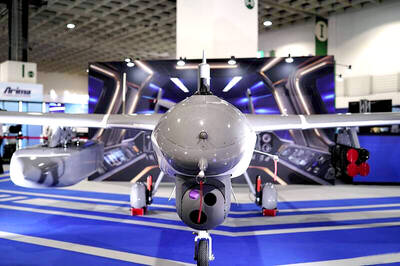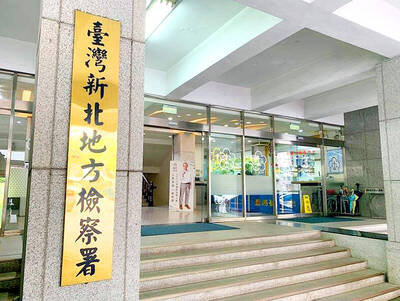Despite a recent government call for businesses to follow the depreciation of the Japanese yen in setting prices, a number of Japanese cosmetics companies are raising the prices of their products, with increases from as low as 3 percent to as much as 16 percent.
Since a landslide victory for the Japanese Liberal Democratic Party (LDP) on Dec. 16 last year, the yen has seen a 10 percent devaluation, due in part to Japanese Prime Minister Shinzo Abe’s economic policies aimed at spurring the nation’s economic growth.
However, instead of setting lower prices, Procter & Gamble (P&G), the maker of SK-II — a Japanese cosmetics and facial care product brand — has increased the price of one of its main products, a popular facial treatment that has sold over 300,000 bottles annually, raising it from NT$3,800 to NT$4,100, a 7.8 percent rise.
It is the third year in a row that P&G has increased SK-II prices, accumulating a total of 24.2 percent in price rises, from NT$3,300 to its current price of NT$4,100, Taiwanese department stores said on Friday, adding that many of their customers are saying that prices are starting to become unaffordable.
In response, P&G said in a press release that the change in prices was a decision made by the firm’s headquarters in Japan, which took into consideration a rise in material cost overheads.
Meanwhile, Shiseido Company Ltd, another Japanese cosmetics and facial care company, has also increased prices of some of its products on Friday, both in Japan and in some international locations, with the average price hike about 3.9 percent.
Shiseido said that the reason it was raising prices of its products was rising materials and logistics costs, adding that it had not changed the pricing of its products since 2009.
Jill Stuart, a subsidiary of Japan’s Kose Group, has also implemented price rises of between 5 percent and 16 percent from earlier this month.
Prices for European products such as some Chanel products have also been increased by up to 4.8 percent, department stores said, adding that the brands Giorgio Armani and Su Uemura also saw recent price hikes of between 5 percent and 7 percent.
According to some retailers, the price increases for cosmetics and skin care products during a time of financial difficulty was a move that capitalized on the loyalty of their female customers and that consumers should act.
They suggested consumers should express their discontent with the companies’ price rises by either reducing their purchases from those brands, or switching to another brand altogether.

SAFE SUPPLY: Drone shipments from Taiwan help Polish companies mitigate disruption from China, which scaled down its sales to European countries Poland has become the biggest buyer of drones from Taiwan as the eastern European country, on Russia’s doorstep, bolsters its defense capabilities and seeks to reduce reliance on Chinese parts. Poland is now absorbing almost 60 percent of Taiwan’s drone exports, which expanded this year to about US$32 million through last month, from almost nothing in the previous years. The next-largest importer of Taiwan’s drones is the US, to which Taiwan sold about US$7 million worth in the same period. Taiwanese drone maker Ahamani said Polish demand was so great it was planning to open a factory there, and that other foreign

Tigerair Taiwan and China Airlines (CAL) today announced that several international flights were canceled or rescheduled due to Typhoon Ragasa. The Central Weather Administration (CWA) has maintained sea and land warnings for the typhoon. Its storm circle reached the Hengchun Peninsula (恆春半島) on Taiwan's southern tip at 11am today. Tigerair Taiwan said it canceled Monday's IT551/IT552 Taoyuan-Da Nang, IT606/IT607 Taoyuan-Busan and IT602 Taoyuan-Seoul Incheon flights. Tomorrow, cancelations include IT603 Seoul Incheon-Taoyuan, as well as flights between Taoyuan and Sapporo, Osaka, Tokyo Narita, Okinawa, Fukuoka, Saga, Tokyo Haneda, Nagoya, Asahikawa and Jeju. On Wednesday, the IT321/IT322 Kaohsiung-Macau round-trip would also be canceled. CAL announced that today's

Taiwan’s Tiffany Queen (鄭宥筠) on Saturday drew wide attention at the Miss International Queen pageant in Thailand for her outfit inspired by elements of Taiwanese folk culture. Although she did not place at the competition, considered the world’s largest transgender beauty contest, attendees described Queen’s outfit as “dazzling,” capturing the audience’s attention when she took the stage. The costume, modeled after the general guards (將軍守) seen in Taiwan’s temple processions, featured a hand-painted mask, a tall headdress and a trident, all symbols of spiritual authority and the power to ward off evil. The guards are regarded as protectors in Taiwanese folk belief,

The New Taipei District Prosecutors' Office yesterday indicted Luxshare Precision Industry Co chairwoman and CEO Grace Wang (王來春) and three others for contravening the Act Governing Relations Between the People of the Taiwan Area and the Mainland Area (臺灣地區與大陸地區人民關係條例). The billionaire businesswoman and cofounder of the China-based electronics manufacturer used a Hong Kong subsidiary in 2018 to acquire a division of Liteon Technology Co, a Taiwanese company, prosecutors said. Wang then sought to register it as an overseas Chinese-invested company, but was rejected by the Ministry of Economic Affairs' Investment Commission because its funding involved Chinese capital, prosecutors said. After the rejection, Wang